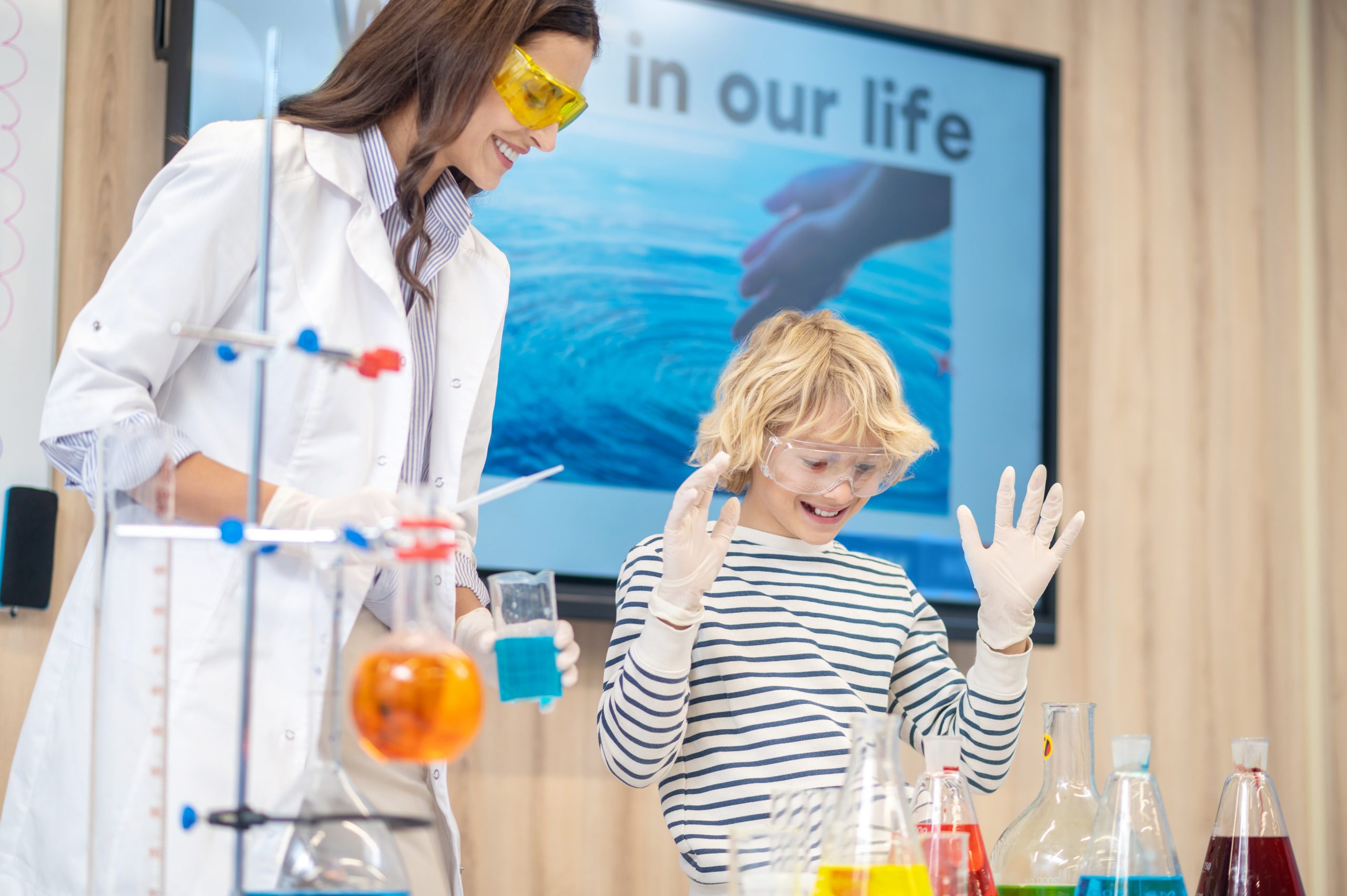Delve into the realm of compelling 5th-grade science fair projects that will spark your inquisitiveness and nurture your budding scientist within. From investigating the wonders of chemistry to constructing models of the human body, these projects are designed to challenge your intellect and unleash your creativity. Stay tuned to discover how these hands-on experiments and explorations will not only broaden your scientific horizons but also captivate your imagination with endless possibilities.
Chemistry Experiments
Engage in captivating chemistry experiments that will spark your curiosity and deepen your understanding of the fascinating world of molecules and reactions. Start by exploring crystal growth, witnessing the mesmerizing formation of unique structures right before your eyes. Dive into the explosive fun of creating Elephant Toothpaste, a foamy fountain that showcases the power of chemical reactions in an exciting way.
Next, delve into the intricate world of heart models, where you can construct a realistic representation to gain insights into the complexity of this vital organ. Then, challenge your engineering skills with windmill design, combining science with creativity as you build a functional model that harnesses the power of wind energy.
Human Body Models
Construct a detailed human body model to gain a comprehensive understanding of the intricacies of our anatomy. By engaging in anatomy demonstrations and physiology activities, you can create organ system models that serve as valuable tools for health education and biology projects. To help you visualize the human body’s complexity, consider the following table:
| Organ System | Description |
|---|---|
| Circulatory System | Responsible for transporting nutrients and oxygen |
| Respiratory System | Facilitates the exchange of oxygen and carbon dioxide |
| Digestive System | Breaks down food for nutrient absorption |
| Nervous System | Controls body functions through electrical signals |
Engaging in constructing these models not only enhances your knowledge but also makes learning about the human body interactive and fun. Experimenting with different materials and designs can provide a hands-on experience that deepens your understanding of how our bodies function. Dive into the world of anatomy and physiology through these captivating projects!
Windmill Engineering
Exploring Windmill Engineering can be a fascinating journey into the intersection of science, history, and renewable energy. Wind energy, a key player in sustainable power generation, is harnessed through intricate blade design, optimizing efficiency. Understanding the dynamics of blade design not only enhances renewable power capabilities but also delves into the historical context of windmills, dating back centuries in various cultures.
By engaging in Windmill Engineering, you not only grasp the scientific principles behind wind energy but also uncover its deep roots in past civilizations. From traditional windmills to modern wind turbines, the evolution of this technology showcases the progression towards cleaner energy sources. Moreover, exploring Windmill Engineering can even lead to literary connections, as windmills have been featured in various literary works, symbolizing both progress and the harmony between humanity and nature.
Dive into Windmill Engineering to witness the synergy between science, history, and sustainability, all while uncovering the poetic allure windmills hold in our collective imagination.
Space Exploration
Delve into the captivating realm of space exploration, where endless mysteries await your curiosity and discovery. Imagine embarking on a journey to distant planets, studying alien life forms, and unraveling the secrets of the universe. Space colonization presents a futuristic vision of humans inhabiting other worlds, while planetary exploration offers the chance to uncover the geological wonders of Mars or the icy moons of Jupiter.
Space technology plays a crucial role in these endeavors, from advanced spacecraft to rovers exploring the Martian surface. Astronaut training prepares individuals for the challenges of space travel, testing their physical and mental capabilities in simulated environments. Whether you’re fascinated by the idea of living on Mars, eager to search for signs of extraterrestrial life, or intrigued by the latest advancements in space technology, the realm of space exploration offers a wealth of opportunities for young scientists to explore and innovate.
States of Matter Projects
Engage with captivating experiments that explore the fascinating realm of states of matter in science projects.
- Matter Transformations: Witness matter changing states through exciting experiments.
- Solid Experiments: Dive into the world of solids with hands-on activities like freezing liquids to observe solidification.
- Liquid Investigations: Explore the behavior of liquids through experiments showcasing viscosity and surface tension.
- Gas Exploration: Unveil the mysteries of gases by conducting experiments that demonstrate gas expansion and contraction.
Coding Education
Discover the essential skill of coding and enhance problem-solving abilities through interactive and fun learning experiences. Robotics programming introduces kids to the world of automation and artificial intelligence. Algorithm basics teach logical thinking and step-by-step problem-solving strategies. Engage in game development to unleash creativity and design skills. Dive into app creation to understand mobile technology and user interface design. Explore cybersecurity fundamentals to learn about online safety and data protection. By delving into coding, you’ll grasp the building blocks of technology, preparing you for the digital world ahead. Whether it’s creating a robot that follows commands or designing your own game, coding education offers endless possibilities for young scientists to experiment, innovate, and challenge themselves. So, grab your laptop, spark your curiosity, and embark on a coding adventure that will shape your understanding of the technological landscape.
Electrical Circuit Activities
To understand electricity better, let’s dive into hands-on electrical circuit activities.
Here are some engaging activities to enhance your understanding of electrical circuits:
- Circuit building challenges: Test your skills by constructing various circuit designs and troubleshooting any issues that arise.
- Conducting salt circuits: Explore how saltwater can conduct electricity and create simple circuits using this unique conductor.
- Food circuit experiments: Discover which foods can conduct electricity and build circuits with everyday edible items.
- Circuit bugs exploration: Get creative by designing circuits in the shape of insects or animals to make learning about electricity fun.
- Understanding conductors: Learn about materials that allow electricity to flow easily and experiment with different conductors to see how they affect circuit performance.
Engage in these activities to grasp the fundamentals of electrical circuits while having a blast experimenting with various components and designs.
Scientific Method Mastery
Let’s embark on a journey into the realm of mastering the scientific method, a fundamental cornerstone of scientific inquiry and experimentation. To excel in scientific method mastery, begin by honing observation techniques and crafting precise hypotheses. Next, dive into experiment design and meticulous data analysis, where variable manipulation is key to drawing accurate conclusions. Embrace the challenge of peer review and sharpen your presentation skills to effectively communicate your findings. Through this process, cultivate critical thinking and problem-solving skills that are essential for any budding scientist. Remember, the scientific method isn’t just a series of steps; it’s a mindset that encourages curiosity, exploration, and discovery. By mastering this method, you are not only advancing your scientific knowledge but also developing skills that will serve you well beyond the science fair. So, roll up your sleeves, put on your thinking cap, and immerse yourself in the exciting world of scientific inquiry!



